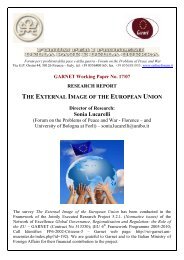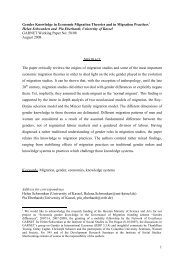GARNET Working Paper No. 13/07
GARNET Working Paper No. 13/07
GARNET Working Paper No. 13/07
Create successful ePaper yourself
Turn your PDF publications into a flip-book with our unique Google optimized e-Paper software.
In other cases, the external intervention might be intended at one particular state, but it will<br />
ultimately bring about positive change in the whole region. UN peacekeeping operations are<br />
paradigmatic in this regard. The deployment of traditional or robust peacekeeping operations,<br />
which might envisage the monitoring of cease-fires, social and political reconstruction,<br />
disarmament, promotion of human rights or enforcement of a cease-fire in one specific<br />
country will likely transform in a positive way the dynamics in a region. For instance the<br />
recent deployment of a UN peacekeeping force in Lebanon following the Israel-Lebanon war<br />
(2006) certainly had broader security goals than the mere pacification of the southern part of<br />
the country.<br />
Regional Provision of Peace and Security<br />
The third example in which the regional level stands out presupposes the emergence of a<br />
regional actor with the capacity to produce peace and security (internally or externally).<br />
Peace (negative and positive) is occasionally treated as a global issue (see Mendez, 1999).<br />
This study does not challenge the idea that peace (and security) is a state (or a value), which,<br />
if produced globally, would benefit virtually everyone. This idea marginalizes, however, the<br />
crucial question of production of peace. As Olson cautioned “the desire for peace (…) for<br />
orderly financial arrangements for multilateral trade, for the advance of basic knowledge, and<br />
for an ecological viable planet are now virtually universal, yet these collective goods are only<br />
episodically or scantily supplied” (cited in Kaul, Grunberg, and Stern, 1999:14). Who is able<br />
to produce and sustain global peace The only global organization, which could legally<br />
provide such arrangement, is the United Nations. But, since its foundation in 1945, the UN<br />
has proven incapable of working as a collective security organization insomuch as the<br />
national security agenda of great powers leads them, regularly, to engage in military disputes,<br />
which are incongruent with the collective security principles. <strong>No</strong>t surprisingly, thereby,<br />
the UN is consigning the responsibility to handle ‘regional conflicts’ to regional<br />
organizations (Diehl and Lepgold, 2003; Pugh and Sidhu, 2003; Graham and Felício, 2006).<br />
In his September 2006 report, ‘A Regional-Global Security Partnership: Opportunities and<br />
Challenges’, former UN Secretary General Kofi Annan briefly sketched this growing trend:<br />
“a representative list of regional and other partners that have collaborated politically or codeployed<br />
with the United Nations peacekeeping operations includes the AU in Burundi,<br />
Ethiopia and Eritrea, the Democratic Republic of Congo and the Sudan; ECOWAS in Ivory<br />
Coast, Sierra Leone and Liberia; the EU in Kosovo, the Democratic Republic of the Congo<br />
23





